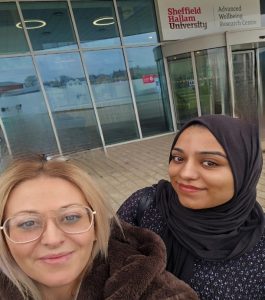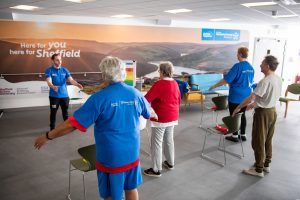AWRC Voices: Trainee Health Practitioners on Research Placement at the AWRC
This week, we meet Safa and Natalie, third year Operating Department Practice (ODP) students at Sheffield Hallam University, who recently spent several weeks with us at the AWRC as part of their research placements. They’ve written for us about their experience here, and how it has impacted their professional development.

Our time together, during our research placement at the Advanced Wellbeing Research Centre (AWRC), was incredibly enriching and eye-opening. As third-year Operating Department Practitioner (ODP) students, our practice has mainly been centred around the operating theatre, often overlooking the vital work involved in a patient’s pre-operative journey. However, through our experience at the clinic, led by Consultant Anaesthetist Dr. Zoe Burton, we’ve been able to learn about the intricate process of prehabilitation before surgical intervention for children.
This unique opportunity has provided us with invaluable insights into the significance of preparing patients both physically and mentally for their peri-operative journey. Witnessing consultations and understanding the efforts invested in optimising patients’ health has underscored the critical importance of wellbeing in anesthesia administration. Moreover, observing application of the biopsychosocial model in practice, has emphasised the importance of adopting a non-judgmental approach, and fostering positive and supportive environments to facilitate patients’ lifestyle changes, for improved overall health and post-operative outcomes.
We’ve also had the privilege to engage in other developmental activities while at the AWRC. We were able to attend a Public Speaking training course, enhancing our ability to engage others and communicate confidently and concisely. We have also had the opportunity to explore cutting-edge body scanning technologies in morphology, supported by Research Fellow Dr Mike Thelwell, and to learn about how these are being used to explore an alternative method to measuring body composition for the purposes of chemotherapy dosing.

We also learnt about another prehabilitation and rehabilitation service, for cancer patients, called Active Together, and it was great to be able to participate in one of the exercise classes. All these experiences have broadened our understanding of holistic patient care and the multidisciplinary efforts involved in promoting wellbeing.
As we reflect on our time at the AWRC, we’re not only inspired by the innovative research and initiatives but also deeply motivated to encourage fellow students to partake in such endeavours. By sharing our experiences and insights, we hope to ignite a passion for holistic patient care and foster a culture of continuous learning and collaboration within the ODP community.
Our time at the AWRC has undoubtedly equipped us with the knowledge, skills, and inspiration to embark on our professional journey with a renewed dedication to patient-centered care and wellbeing.
During our time at the AWRC, we’ve had some fantastic opportunities to grow our research skills. We learnt about the importance of safety, integrity, and quality in research projects, and understanding everyone’s roles and responsibilities.
We engaged in activities that enhanced our skills in literature searching and the development of research questions. This was aligned to our work in the children’s prehabilitation clinic, that we then presented a rationale and justification for, supported by helpful discussion with Senior Research Fellow Dr Cath Homer (Lead for the Healthy & Active 100 research theme at the AWRC).
We also had a session on statistics with Dr Rob Appleyard (Postgraduate Research Tutor for Health at SHU). We discovered how data is collected, organized, analysed, and interpreted. This knowledge gave us insights into how differences, correlations and trends within data can be explored, supporting researchers to draw meaningful conclusions. Overall, we now have an increased understanding of how research and innovation can directly improve the clinical services we provide.
It’s been an enlightening journey, and we’re excited to continue applying these skills within our professional practice. We have developed an enthusiasm for research and the potential opportunities to engage in this, as part of our future career.
We want to say thank you to everyone at the AWRC for welcoming us with open arms and providing us with the opportunity to be involved in the many projects that take place here.
We would especially like to thank Catherine Holborn for organising our whole timetable and giving us as many opportunities as possible to enhance our learning and development, and Dr Zoe Burton for allowing us to shadow her during consultations and allowing us to see the great work that she does.
